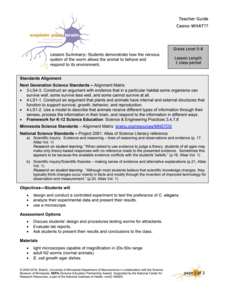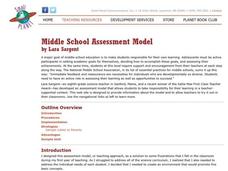Core Knowledge Foundation
The Human Body—Systems and Senses Tell It Again!™ Read-Aloud Anthology
Nine lessons over three weeks explore the human body through read-alouds. Third graders listen to and discuss a reading followed by extension activities, including word work and comprehension practice. Learners draft a narrative essay.
Rice University
Biology for AP® Courses
An eight-unit electronic textbook provides a guide to AP® Biology. Each of the 28 chapters include an introduction, multiple lessons, a summary, review questions, and test prep questions. Teachers see how each lesson connects to a big...
University of Minnesota
Caeno-WHAT??
Can you feel that? Can you smell that? Since pupils can't ask worms about their sense of smell and touch, they design and complete an experiment to answer these questions. Individuals expose nematodes to different stimuli using their...
University of Minnesota
WebQuest: Structure of the Nervous System
What could be more natural than learning about learning? Scholars research the central nervous systems and the learning process through a well-designed WebQuest. They study the structure as well as discover the functions of those...
Health Smart Virginia
So Stressed, Now Stress Less
Carrot, egg, or tea? A parable gets teens thinking about how, when faced with the same adversity, people respond differently. As the lesson progresses, class members learn about how stress is regulated by the sympathetic and...
Nemours KidsHealth
Concussions: Grades 6-8
Teach middle schoolers to learn how to prevent concussions, recognize the symptoms of a concussion, and what they should do in case of a concussion. After reading articles that provide background information, groups create factsheets...
Nemours KidsHealth
Concussions: Grades 9-12
Spread the word about concussions! After reading articles about concussions and sports safety, small groups create paper slide videos to educate their peers about concussions, their symptoms, long-term consequences, and how to protect...
American Museum of Natural History
Trip Up Your Brain
Sometimes different parts of the brain disagree. See what this disagreement looks like using a remote learning resource to experience how brains often take shortcuts. Pupils complete the activity, observe their results, and then read...
American Museum of Natural History
Brain Power
Did you know it's possible to train your brain to work better? Learners use brain games to try to do just that. The games test vision and memory and give them the opportunity to improve their scores. The lesson works as an in-class...
Small Planet Communications
The Nervous System
Eighth graders perform a variety of activities to explore the human nervous system--making posters, charts, presentations, etc. All activities are extremely well designed and planned for clear assessment.
Open Curriculum
Open Curriculum: The Nervous System
Students learn to identify the type of cells that make up nervous tissue.
Khan Academy
Khan Academy: A Virus Which Affects Mouse Muscles
Prepare for the MCAT by reading this passage and answering questions based on the given table about how different viral doses affect behavioral or electrical abnormalities in mice.













